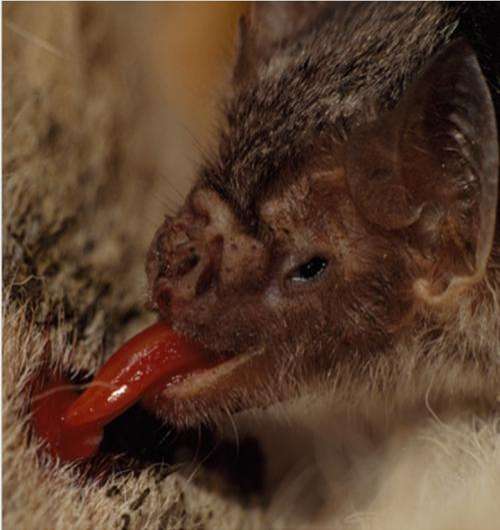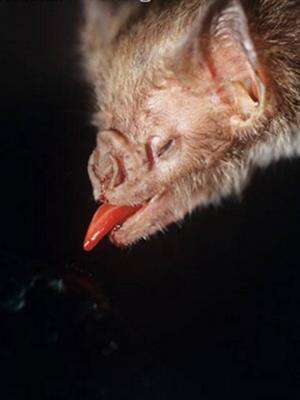June 25, 2014 report
Researchers find vampire bats have limited capacity to taste bitter substances

(Phys.org) —A pair of researchers in China has found vampire bats have difficulty tasting bitter flavors. In their paper published in Proceedings of the Royal Society B: Biological Sciences, Wei Hong and Huabin Zhao of Wuhan University, describe how they conducted a genomic analysis on the bats and followed up what they'd found with an analysis of known bitter taste receptor genes also in the bats to learn more about their taste abilities.
Vampire bats eat only blood—the only mammal to do so—which means they are very unlikely to encounter toxins in their food. Scientists believe animals in general have developed a means for tasting bitterness in foods as a means of detecting toxins, thus it would make sense, the pair of researchers reasoned, for vampire bats to lose such an ability—prior research had shown, after all, vampire bats can't taste sweet or umami (savory) flavors.
To find out more, the researchers conducted an analysis of the genomes of the three types of vampire bats and found that they did indeed have the receptor genes necessary for tasting bitter flavors, which suggested they should be able to taster bitterness in foods. Surprised by their findings they collected DNA samples from 11 other species of non blood-eating bats. Further study revealed that the vampire bats had a far higher percentage of non-functioning (damaged or mutated) receptor genes dedicated to discerning bitterness than other species of bats (47 percent compared to 4.3 percent). This means vampire bats have very little bitterness discerning capabilities. The findings suggest vampire bats once were able to taste bitter substances in their food, but have been losing it ever since, as it's no longer needed—there is very little chance of finding bitter toxins in the blood they eat.

The researchers note vampire bats locate their food using echolocation, smell and even heat detection, leaving taste as a relatively unimportant part of finding food. Instead, they find an animal with a lot of capillaries under the skin, bite them and lick up the blood that flows out. Their saliva contains an anticoagulant to ensure they get their fill before the supply is cut off.
More information: Vampire bats exhibit evolutionary reduction of bitter taste receptor genes common to other bats, Proceedings of the Royal Society B, rspb.royalsocietypublishing.or … nt/281/1788/20141079
Abstract
The bitter taste serves as an important natural defence against the ingestion of poisonous foods and is thus believed to be indispensable in animals. However, vampire bats are obligate blood feeders that show a reduced behavioural response towards bitter-tasting compounds. To test whether bitter taste receptor genes (T2Rs) have been relaxed from selective constraint in vampire bats, we sampled all three vampire bat species and 11 non-vampire bats, and sequenced nine one-to-one orthologous T2Rs that are assumed to be functionally conserved in all bats. We generated 85 T2R sequences and found that vampire bats have a significantly greater percentage of pseudogenes than other bats. These results strongly suggest a relaxation of selective constraint and a reduction of bitter taste function in vampire bats. We also found that vampire bats retain many intact T2Rs, and that the taste signalling pathway gene Calhm1 remains complete and intact with strong functional constraint. These results suggest the presence of some bitter taste function in vampire bats, although it is not likely to play a major role in food selection. Together, our study suggests that the evolutionary reduction of bitter taste function in animals is more pervasive than previously believed, and highlights the importance of extra-oral functions of taste receptor genes.
Journal information: Proceedings of the Royal Society B
© 2014 Phys.org


















